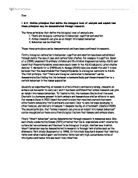Outline principles that define cognitive level of analysis
Outline principles that define cognitive level of analysis (8mks)
Cognitive psychology deals with how the mind functions and responds to the things that we see around us. It involves mental tasks, perception, thinking and problem solving. There are three main principles that highlight the cognitive level of analysis.
The first principle that defines this level of analysis is that human beings are information processors and that mental processes guide behaviour. This simple means that there is a relationship between how people think and behave. Information is transformed and organized according to the way people perceive and interpret what is going on around them.
This principle was demonstrated in Darley and Gross’s experiment. In this experiment, they showed to their participants, videos of a girl playing in a poor environment then in a wealthy environment. The participants were then asked to judge the future of the girl based on how she would perform on an intelligence test. All the participants said that the “poor” girl would do worse than the “wealthy girl”. This shows that the participants already had a schema of how the environment would affect the girl’s performance on the test. This happens because human beings take in and actively process information based on a few vague details that they are given to form a conclusion that may not be correct.








